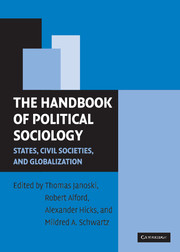Book contents
- Frontmatter
- Contents
- Preface
- Contributors
- Political Sociology in the New Millenium
- PART I THEORIES OF POLITICAL SOCIOLOGY
- PART II CIVIL SOCIETY: THE ROOTS AND PROCESSES OF POLITICAL ACTION
- PART III THE STATE AND ITS MANIFESTATIONS
- 18 State Formation and State Building in Europe
- 19 Transitions to Democracy
- 20 Revolutions and Revolutionary Movements
- 21 Regimes and Contention
- 22 Theories and Practices of Neocorporatism
- 23 Undemocratic Politics in the Twentieth Century and Beyond
- 24 State Bureaucracy
- PART IV STATE POLICY AND INNOVATIONS
- PART V GLOBALIZATION AND POLITICAL SOCIOLOGY
- References
- Name Index
- Subject Index
19 - Transitions to Democracy
Published online by Cambridge University Press: 05 June 2012
- Frontmatter
- Contents
- Preface
- Contributors
- Political Sociology in the New Millenium
- PART I THEORIES OF POLITICAL SOCIOLOGY
- PART II CIVIL SOCIETY: THE ROOTS AND PROCESSES OF POLITICAL ACTION
- PART III THE STATE AND ITS MANIFESTATIONS
- 18 State Formation and State Building in Europe
- 19 Transitions to Democracy
- 20 Revolutions and Revolutionary Movements
- 21 Regimes and Contention
- 22 Theories and Practices of Neocorporatism
- 23 Undemocratic Politics in the Twentieth Century and Beyond
- 24 State Bureaucracy
- PART IV STATE POLICY AND INNOVATIONS
- PART V GLOBALIZATION AND POLITICAL SOCIOLOGY
- References
- Name Index
- Subject Index
Summary
FROM STRUCTURES TO TRANSITIONS
Explaining the interest of social scientists like himself in democratic transitions, one eminent student of the subject recalls: “I'm Polish and I got involved with democratization for the first time by being beaten by police in 1957 at a student demonstration when the government closed a student newspaper. I left Poland; I came here; I went to Chile; saw democracy being destroyed there; and came back to the United States” (Przeworski, 1997:6). What is to be understood is a process – democratization – not a stable state of affairs. It may be undone (as in Chile). It involves serious conflict. It is shaped by parties in such conflict (such as troublemaking students and order-defending police), whose actions, achievements, and understandings eventually lead scholars to their own new understandings.
At the moment when government violence got our witness to thinking, and for a couple of decades after that, much scholarly reflection saw democracy resting on elements of social structure or culture not found in all countries. Places endowed with certain constellations of economic interests or imbued with certain kinds of values would be those likely to have democratic government, those less endowed or imbued less likely. Seymour Martin Lipset, for example, pointed out that the economically developed countries of the midtwentieth century were the democratic ones. He argued that growing national wealth reduced the stakes in social conflicts and made democratic compromise attractive to rich and poor alike at the same time as fostering a large middle class with tolerant values (Lipset, 1981[1960]:27–63).
- Type
- Chapter
- Information
- The Handbook of Political SociologyStates, Civil Societies, and Globalization, pp. 384 - 403Publisher: Cambridge University PressPrint publication year: 2003
- 2
- Cited by



